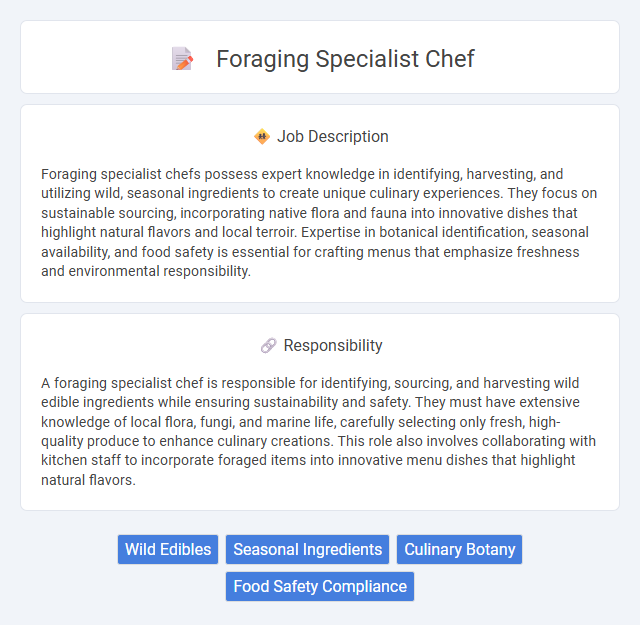
Foraging specialist chefs possess expert knowledge in identifying, harvesting, and utilizing wild, seasonal ingredients to create unique culinary experiences. They focus on sustainable sourcing, incorporating native flora and fauna into innovative dishes that highlight natural flavors and local terroir. Expertise in botanical identification, seasonal availability, and food safety is essential for crafting menus that emphasize freshness and environmental responsibility.
Individuals who thrive in dynamic, outdoor environments with a passion for nature and sustainable sourcing will likely find the foraging specialist chef role suitable. Those with physical stamina, strong knowledge of edible plants, and a keen eye for detail have a higher probability of excelling in this position. Conversely, people who prefer structured indoor settings or have limited interest in wild food ecosystems might find this job less fitting.
Qualification
A foraging specialist chef requires extensive knowledge of edible wild plants, fungi, and herbs, combined with expertise in sustainable harvesting techniques and food safety standards. Proficiency in botany and mycology enhances ingredient identification and quality control, while culinary skills ensure the creation of innovative dishes using foraged items. Certification in food handling, wilderness survival training, and experience with local ecosystems are essential qualifications for success in this role.
Responsibility
A foraging specialist chef is responsible for identifying, sourcing, and harvesting wild edible ingredients while ensuring sustainability and safety. They must have extensive knowledge of local flora, fungi, and marine life, carefully selecting only fresh, high-quality produce to enhance culinary creations. This role also involves collaborating with kitchen staff to incorporate foraged items into innovative menu dishes that highlight natural flavors.
Benefit
A foraging specialist chef likely offers unique benefits by sourcing fresh, wild ingredients that enhance the flavor and nutritional profile of dishes. This role probably supports sustainability and local ecosystems through eco-friendly ingredient collection. Customers may experience more authentic, seasonal flavors and restaurants could benefit from a distinctive culinary identity.
Challenge
Foraging specialist chef roles likely involve navigating the unpredictable availability of wild ingredients, demanding adaptability and keen knowledge of seasonal ecosystems. The challenge of ensuring ingredient safety and quality while sourcing from natural, uncontrollable environments may require advanced expertise and rigorous standards. Managing the balance between creativity and sustainability could frequently test a chef's problem-solving skills and commitment to ethical culinary practices.
Career Advancement
Foraging specialist chefs enhance culinary expertise by sourcing wild, seasonal ingredients that elevate menu creativity and sustainability. Mastery in plant identification and eco-friendly harvesting techniques positions them as valuable assets in innovative kitchens, leading to roles such as executive chef or sustainable cuisine consultant. Continuous education in botany and environmental practices opens pathways for career advancement in gastronomy and food sustainability sectors.
Key Terms
Wild Edibles
A foraging specialist chef excels in identifying, harvesting, and preparing wild edibles, using their deep knowledge of native plants, fungi, and herbs to create innovative, sustainable dishes. Expertise in wild edibles such as ramps, wild garlic, fiddleheads, and purslane ensures the chef sources fresh, nutrient-rich ingredients that elevate culinary experiences. Mastery of seasonal availability and safe foraging practices is critical to maintaining quality and environmental stewardship in menu development.
Seasonal Ingredients
Foraging specialist chefs excel in identifying and harvesting seasonal ingredients from wild environments, ensuring dishes feature fresh, nutrient-rich components at peak flavors. Expertise in local flora and sustainable collection methods allows these chefs to transform native plants, fungi, and herbs into innovative culinary creations. Their work supports seasonal menus that highlight biodiversity and promote environmental stewardship in gourmet gastronomy.
Culinary Botany
A foraging specialist chef expertly sources and incorporates wild, seasonal ingredients into gourmet dishes, emphasizing the principles of culinary botany. Their deep knowledge of edible plants, herbs, and fungi enhances flavor profiles while promoting sustainability and biodiversity in menu creation. Mastery of plant identification and ecological foraging methods ensures both safety and innovation in transforming natural ingredients into exquisite culinary experiences.
Food Safety Compliance
Foraging specialist chefs must rigorously adhere to food safety compliance standards to prevent contamination and ensure the safe consumption of wild ingredients. They conduct thorough identification and testing of foraged items, adhering to local regulations and health guidelines to avoid toxic or allergenic substances. Implementing strict sanitation protocols throughout the foraging and preparation process is essential to maintain food safety and uphold industry certifications.
 kuljobs.com
kuljobs.com